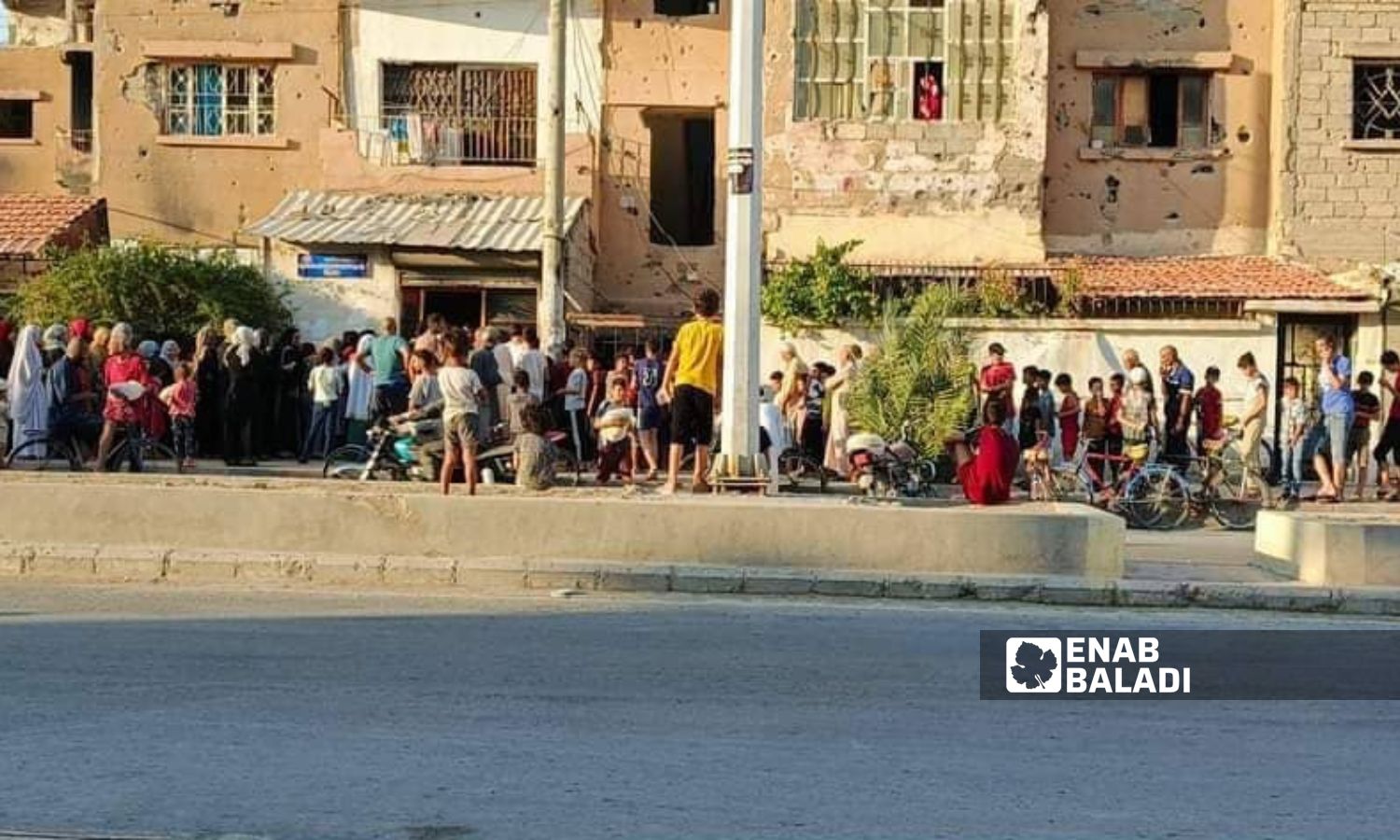



Deir Ezzor – Obadah al-Sheikh
Following the decision by the regime-led Directorate of Supply in Deir Ezzor province to activate bread distribution through the smart card, residents are struggling to get their shares, queuing for long hours in front of bakeries.
The new mechanism has resulted in difficulties in obtaining individual shares according to the schedule issued by the directorate for the number of family members, reminding residents of past crises in the region, as some of them told Enab Baladi.
Deir Ezzor city, under regime control, suffers from a severe lack of services on all levels, including continuous power cuts and poor road conditions, amid an almost complete absence of responsible authorities.
Aliya al-Oujan, residing in the Rashidiya district of Deir Ezzor, recently started to face problems similar to most city residents while trying to get a loaf or a pack of bread, especially as she waits long hours for the appointed dealer assigned by the Directorate of Supply in the city.
Al-Oujan told Enab Baladi that standing in the queue for bread is somewhat manageable, but the distribution timing makes it even more difficult, as in some neighborhoods it starts after midnight, besides the irregular distribution times and dealers not sticking to schedules, in addition to the increase in bread bundle prices by dealers.
A bread bundle is supposed to be sold at 1000 Syrian pounds, but some dealers sell it for 1300 Syrian pounds, while relevant authorities do not listen to citizens’ complaints, according to al-Oujan.
Some families suffer from inadequate shares allocated to them, especially as residents have come to rely on bread as a staple in all meals due to rising prices of essential goods in the markets, contributing to depriving residents of most food and commodity items, said Abdullah al-Kanameh, a resident of Deir Ezzor city.
Laith al-Alwan, a school teacher in Deir Ezzor, believes that the decision to use the smart card in the city was not well-thought-out, especially with the government’s move to lift subsidies on bread, he told Enab Baladi.
Al-Alwan expressed surprise at the timing of this decision, questioning why the previous distribution system was not maintained without using the smart card, pointing out the deteriorating quality of bread since the decision implementation due to poor storage.
Mahmoud al-Sayed told Enab Baladi that he used to get a bread bundle daily, but with the distribution via the smart card, his share is now two bundles weekly, each containing 14 loaves, noting that this is not enough for him, his wife, and his little daughter.
An employee at the Directorate of Supply, who preferred not to be named for security concerns, told Enab Baladi that several bakeries and dealers were caught committing violations, including poor bread production, reducing pack weights, refraining from selling, providing inadequate services, charging exorbitant prices, and trading subsidized bread. Violations relating to dealers’ non-compliance with instructions were also recorded.
While residents of Deir Ezzor suffer from a severe shortage of bread, the prices of tourist bread, the expected alternative to subsidized bread, vary between shops and can reach 10,000 Syrian pounds per large pack in most groceries, while the price of a “Mashrooh” (Tandoor) bread loaf in the city reaches 1200 Syrian pounds.
In a special interview with Al Arabiya channel, UN envoy to Syria, Geir Pedersen, provided a quick overview of the main outstanding issues in the Syrian file, starting with the issue of detainees and the missing, and the economic and humanitarian crisis, up to the existence of nearly 12 million displaced people.
Pedersen said in the interview published last May, “Assad cannot determine the outcome of the conflict in Syria, nor can the Russians, the Iranians, the Turks, or the Americans, nor anyone else,” considering that the situation in Syria is “extremely bleak,” with about 16.9 million people in need of humanitarian assistance and nine out of ten people suffering from poverty.
In Syria, 16.7 million people need humanitarian assistance, an increase of 9% compared to 2023, according to the United Nations High Commissioner for Refugees (UNHCR).
Additionally, 80% of the Syrian population needs some form of humanitarian assistance in 2024, according to a February 12 statistic published by the World Food Programme (WFP) on the number of people suffering from food insecurity in Syria.
Approximately 55% of the population in Syria, or 12.9 million people, suffer from food insecurity, with 3.1 million suffering severe food insecurity.
if you think the article contain wrong information or you have additional details Send Correction